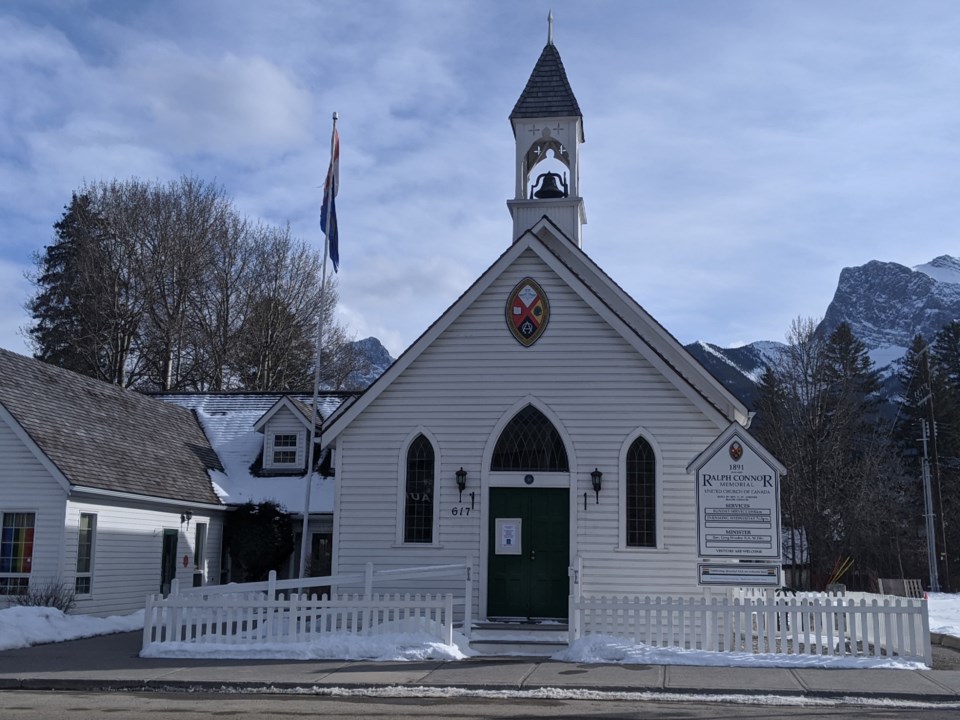CANMORE – Your local church will never ask you to purchase gift cards through email.
That is a message local Reverend Greg Wooley with the Ralph Connor Memorial United Church is trying to share after a number of members with the local congregation received emails asking for the donation of gift cards to fundraise for COVID-19 efforts.
“People are in a very generous space and I really celebrate that, but that also makes them increasingly vulnerable for frauds and scams that are praying on their better nature,” Rev. Wooley said in a phone interview.
According to the Canadian Anti-Fraud Centre, email and text scams are common where a scammer will contact the victim asking for a donation for a charity, association, federation or religious cause where the scammer uses high-pressure tactics to get the victim to donate immediately. Typically the charity does not exist, or the scammer is not associated with it.
Wooley said a number of churches in the Bow Valley had their members targeted with the same email scam where the scammer would email people with the congregation, using the name of a local pastor, priest or minister asking for the purchase of gift cards in a second email exchange.
“The first [email] basically says I need to talk to you and do not phone, but contact through email and it is masquerading as one of the ministers or reverends, then once the recipient responds, a second email comes and asks for donations,” he said.
The local reverend was alerted to the scam when a member of the Ralph Connor Memorial United Church received the first email and thought it was out of character for Wooley. After looking into it, Wooley said he realized a couple of members of his congregation had received similar emails with other churches in the area dealing with the same email scam.
Earlier this month, Alberta RCMP sent out a press release warning citizens of a spike in COVID-19 related scares including fraudulent merchandise sales and phishing emails.
Some of the scams in the province include fraudulent merchandise sales or fake giveaways of health-related products, such as facemasks and COVID-19 tests, with the products promoted as free with a shipping fee.
Other scams include individuals being advised of fake positive test results, donation campaigns, door-to-door decontamination services and self-assessment surveys.
RCMP reminded Albertans to never give out personal and financial details, not to click on suspicious links or attachments, be sceptical of emails even if they look legitimate and check the "from" address when hovering over the name.
Canmore Sgt. Stan Andronyk said the scams where victims get a call or email asking for gift cards is one the local station deals with routinely.
"Always be vigilant and be careful when people are calling or emailing asking for anything and always corroborate with the person you think contacted you," Andronyk said.
"Be wary when people are asking for gift cards and why they are asking – [scammers] are always looking to take advantage of the current situation."
Wooley shared the same advice.
“I wouldn’t personally ask for anything regarding fundraising – when it comes to fundraising and donations, those things always come through more predictable channels, authorized newsletters or a campaign,” he said.
The scammer emailed people from the congregation using the name of a local church official, but with an unfamiliar return email address. Wooley said he has noticed this particular scam used the email format “church online ### @ gmail.com."
“Double check the email address it is coming from, it might have my name or a pastor's name or looks like it is from a church, but double-check the email address it is coming from – if it doesn’t look familiar, do not take any action, do not even open it,” he said.
So far, that Wooley is aware of, the scammers have not been successful in getting gift cards out of the local congregation.
"One person had gone ahead and purchased gift cards but hadn’t followed through on all the instructions, so they had not gone all the way through where they couldn’t recover it,” Wooley said.
While there is never a good time to be part of a targeted email scam, the reverend did say it was a particularly unfortunate situation for local residents, as it was around the same time Tourism Canmore Kananaskis launched the Hope for Hospitality community food card program.
Estimating upwards of 80 per cent of the tourism and hospitality industry workers were facing layoffs or have been laid off, Tourism Canmore Kananaskis started the initiative to get $100 food gift cards into the hands of hospitality and tourism workers who need it most.
“For decades, visitors have been inspired by the experiences they’ve had here. We have relied upon dedicated employees to carry out those amazing experiences time and again. And they’ve delivered, from within our hotels, restaurants, retail gems, and from our longest trails and tallest peaks. Now, these people are facing an uncertain road ahead due to the COVID-19 global pandemic,” Tourism Canmore Kananaskis wrote in a statement.
The goal is every dollar collected would be used to purchase $100 food gift cards for local grocery stores with businesses to distribute the cards to employees.
But as with any legal fundraiser, the local initiative asked for cash or cheque donations and offered a tax receipt.
“Anything that comes spur of the moment asking for money should raise suspiciousness even if it looks like it comes through a trusted source,” Wooley said.
To stay up to date on current scams in Canada, visit the Canadian Anti-Fraud Centre website.
Follow RMOToday.com's COVID-19 special section for the latest local and national news on the coronavirus pandemic, as well as resources, FAQs and more.



